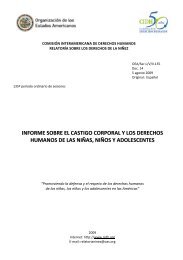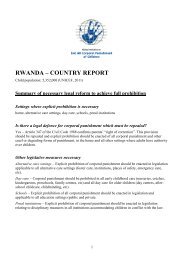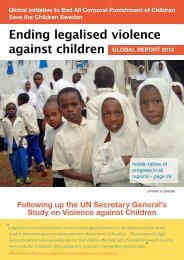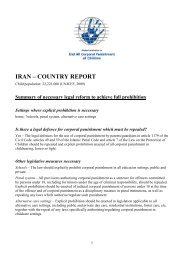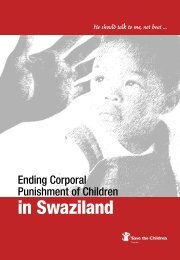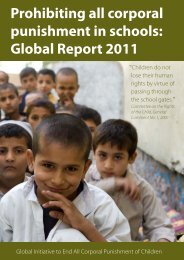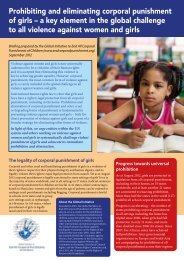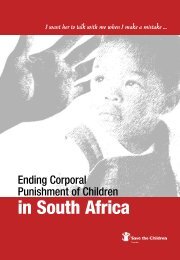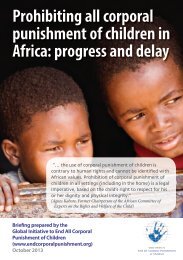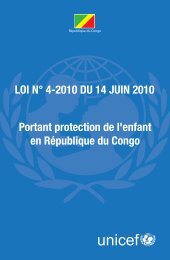Prohibiting corporal punishment of children in the Caribbean ...
Prohibiting corporal punishment of children in the Caribbean ...
Prohibiting corporal punishment of children in the Caribbean ...
You also want an ePaper? Increase the reach of your titles
YUMPU automatically turns print PDFs into web optimized ePapers that Google loves.
BARBADOSCountry Reports: Independent statesChild population (0-17): 60,000 (UNICEF, 2010)Current legality <strong>of</strong> <strong>corporal</strong> <strong>punishment</strong>Home (lawful): Article 4 <strong>of</strong> <strong>the</strong> Prevention <strong>of</strong> Cruelty to Children Act (1904) confirms “<strong>the</strong> right <strong>of</strong> any parent, teacher oro<strong>the</strong>r person hav<strong>in</strong>g <strong>the</strong> lawful control or charge <strong>of</strong> a child to adm<strong>in</strong>ister <strong>punishment</strong> to such child”. Provisions aga<strong>in</strong>stviolence and abuse <strong>in</strong> <strong>the</strong> Domestic Violence (Protection Orders) Act (1994), <strong>the</strong> Protection <strong>of</strong> Children Act (1990), <strong>the</strong>Employment (Miscellaneous Provisions) Act (1977) and <strong>the</strong> Offences Aga<strong>in</strong>st <strong>the</strong> Person Act (1994) are not <strong>in</strong>terpreted asprohibit<strong>in</strong>g <strong>corporal</strong> <strong>punishment</strong> <strong>in</strong> childrear<strong>in</strong>g.Schools (lawful): Education Regulation 18(j) authorises pr<strong>in</strong>cipals to <strong>in</strong>flict <strong>corporal</strong> <strong>punishment</strong> and to delegate <strong>the</strong>authority to do so to <strong>the</strong> deputy pr<strong>in</strong>cipal and senior teachers. In 2006, <strong>the</strong> Government stated that “<strong>the</strong> Government andpeople <strong>of</strong> Barbados did not view <strong>corporal</strong> <strong>punishment</strong> as torture, or <strong>in</strong>humane or degrad<strong>in</strong>g <strong>in</strong> itself” and <strong>the</strong>re were no plansto review its legality. 5 Dur<strong>in</strong>g <strong>the</strong> UPR <strong>of</strong> Barbados <strong>in</strong> 2008, <strong>the</strong> Government noted that <strong>the</strong> M<strong>in</strong>ister <strong>of</strong> Education’s publicadvocacy for abolition <strong>of</strong> <strong>corporal</strong> <strong>punishment</strong> <strong>in</strong> schools did not reflect <strong>the</strong> <strong>of</strong>ficial position. 6Penal system – sentence for crime (lawful): The Magistrate’s Courts Act provides for boys aged 8-15 to be “privatelywhipped” at a police station, up to 12 strokes with a “tamar<strong>in</strong>d or o<strong>the</strong>r similar rod”, <strong>in</strong> place <strong>of</strong> or <strong>in</strong> addition to any o<strong>the</strong>r<strong>punishment</strong> (article 71). The Juvenile Offenders Act provides for young <strong>of</strong>fenders to be whipped (article 16(f)) and for boysaged 12-15 to be “privately whipped” <strong>in</strong> lieu <strong>of</strong> or <strong>in</strong> addition to any o<strong>the</strong>r <strong>punishment</strong> (article 9). Under <strong>the</strong> CorporalPunishment Act, whipp<strong>in</strong>g or flogg<strong>in</strong>g should be adm<strong>in</strong>istered on a s<strong>in</strong>gle occasion, up to 12 strokes for persons under 16, 24for older persons (article 2).Penal system – discipl<strong>in</strong>ary measure <strong>in</strong> penal <strong>in</strong>stitutions (lawful):The Reformatory and Industrial Schools Act (1926) authorises <strong>corporal</strong><strong>punishment</strong> as a discipl<strong>in</strong>ary measure on boys (article 31) and allowsa magistrate to order whipp<strong>in</strong>g as a <strong>punishment</strong> for attemptedescape (article 34); <strong>the</strong> Prisons Act (1964) allows <strong>the</strong> use <strong>of</strong> force forma<strong>in</strong>ta<strong>in</strong><strong>in</strong>g discipl<strong>in</strong>e (article 20) and <strong>corporal</strong> <strong>punishment</strong> for specificdiscipl<strong>in</strong>ary <strong>of</strong>fences, up to 12 strokes for persons under 21 (article 40).Alternative care sett<strong>in</strong>gs (partial prohibition): Corporal <strong>punishment</strong>is reportedly prohibited <strong>in</strong> state-arranged foster care and <strong>in</strong> pre-schoolsett<strong>in</strong>gs, and <strong>the</strong> Child Care Board Regulations (1985) prohibit it <strong>in</strong>day care centres and residential <strong>children</strong>’s homes run by <strong>the</strong> Board; it islawful <strong>in</strong> private foster care under article 4 <strong>of</strong> <strong>the</strong> Prevention <strong>of</strong> Crueltyto Children Act (see above).Law reform necessary to achieveprohibition <strong>in</strong> BarbadosIslam and <strong>corporal</strong> <strong>punishment</strong> <strong>in</strong> alternativecareRepeal <strong>of</strong> right “to adm<strong>in</strong>ister <strong>punishment</strong>” (<strong>in</strong>Prevention <strong>of</strong> Cruelty to Children Act); repeal<strong>of</strong> provisions authoris<strong>in</strong>g <strong>corporal</strong> <strong>punishment</strong>(<strong>in</strong> Education Act, Education Regulations,Juvenile Offenders Act, Corporal PunishmentAct, Magistrates Jurisdiction and Procedure Act,Magistrate’s Court Act, Prisons Act, Reformatoryand Industrial Schools Act); explicit prohibition<strong>of</strong> <strong>corporal</strong> <strong>punishment</strong> <strong>in</strong> <strong>the</strong> home, schools,penal system and alternative care sett<strong>in</strong>gs.Human rights jurisprudence on <strong>corporal</strong> <strong>punishment</strong>Treaty body recommendations/observations: Committee on <strong>the</strong> Rights <strong>of</strong> <strong>the</strong> Child (1999); 7 Human Rights Committee(2007) 8UPR (2008): Government rejected recommendations to prohibit but accepted recommendation for public awareness<strong>in</strong>itiatives to change public attitudes. 95 25 September 2006, CCPR/C/BRB/3, Third state party report to <strong>the</strong> Human Rights Committee, para. 2446 9 January 2009, A/HRC/10/73, Report <strong>of</strong> <strong>the</strong> Work<strong>in</strong>g Group, para. 497 24 June 1999, CRC/C/15/Add.103, Conclud<strong>in</strong>g observations on <strong>in</strong>itial report, paras.19 and 228 11 May 2007, CCPR/C/BRB/CO/3, Conclud<strong>in</strong>g observations on third report, para. 129 16 March 2009, A/HRC/10/73/Add.1, Report <strong>of</strong> <strong>the</strong> Work<strong>in</strong>g Group: Addendum, paras. 21 and 23progress report 2012 35




